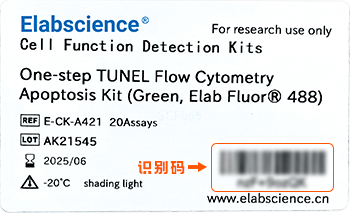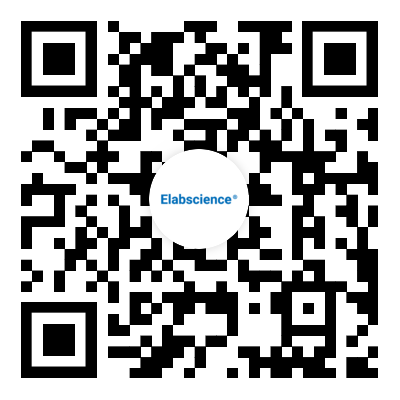Dkk-4 Polyclonal Antibody(Capture/Detector)

Price:
- 宿主: Rabbit
- 反应性: Human;Rat
- 应用性: ELISA Capture/Detector;WB
| Verified Samples |
Verified Samples in ELISA: Recombinant Human Dkk-4 protein, Human serum, Human plasma Verified Samples in WB: Rat serum |
| Dilution | ELISA Capture 2-8 μg/mL, ELISA Detector 0.1-0.4 μg/mL, WB 1:1000-1:2000 |
| Clonality | Polyclonal |
| Isotype | Rabbit IgG |
| Immunogen | Recombinant Human Dkk-4 Protein expressed by E.coli |
| Abbre | Dkk-4 |
| Synonyms | Dkk, DKK4, Dickkopf-4, hDkk-4 |
| Swissprot | |
| Calculated MW | 25 kDa |
| Observed MW | 25 kDa |
| Concentration | 1 mg/mL |
| Storage | Store at 4°C valid for 12 months or -20°C valid for long term storage, avoid freeze / thaw cycles. |
| Buffer | Phosphate buffered solution, pH 7.2, containing 0.05% proclin 300. |
| Purification Method | Antigen Affinity Purification |
| Research Areas | Stem Cells |
| Conjugation | Unconjugated |
| Background | Dickkopf related protein 4 (Dkk-4) is a member of the Dkk protein family that includes Dkk-1, -2, -3, and -4. All four members are secreted proteins that are synthesized as precursor proteins with an N‑terminal signal peptide and 2 conserved cysteine‑rich domains, which are separated by a linker region. Dkk proteins have potential furin type proteolytic cleavage sites, and short forms of Dkk-2 and Dkk-4 containing only the second cysteine‑rich domain can be generated by proteolytic processing. Dkk proteins have distinct patterns of expression in adult and embryonic tissues, suggesting that they may play diverse roles in these tissues. The Dkk proteins have distinct effects on Wnt signaling. Dkk-1 and Dkk-4 are Wnt antagonists. Dkk-3 has not been demonstrated to affect Wnt signaling, and Dkk-2 acts as an agonist or antagonist, depending on the cellular context. Wnt signaling regulates many important developmental processes including neural crest differentiation, brain development, kidney morphogenesis, and sex determination. In addition, Wnt signaling has also been implicated in tumor formation. Canonical Wnt signaling via the beta -catenin pathway is transduced by a receptor complex composed of the Frizzled proteins (Fz) and low-density lipoprotein (LDL) receptor-related proteins (LRP5/6). Unlike many soluble Wnt antagonists that function by binding extracellular Wnt ligands to prevent interaction of Wnt with the Fz-LRP5/6 receptor complex, Dkk-1 and Dkk-4 antagonize Wnt/ beta -catenin signaling by direct high-affinity binding to the Wnt coreceptor LRP5/6 and inhibiting interaction of LRP5/6 with the Wnt-Frizzled complex. Dkk-1 and Dkk-4 also bind the transmembrane proteins Kremen1 (Krm1) and Krm2 with high-affinity. Krm2 has been shown to form a ternary complex with Dkk-1 or -4 and LRP5/6 to trigger internalization of the complex and removal of LRP6 from the cell surface. Thus, Dkk-1/4 and Kremens function synergistically to antagonize LRP5/6-mediated Wnt activity. Dkk-2 also binds to LRP5/6 and the Kremens, but Dkk-2 acts as an antagonist of the Wnt signaling pathway only in the presence of Krm2. Dkk-2 binding to LRP5/6 in the absence of Krm2 activates rather than inhibits Wnt signalling. |
| PDEH100569 | Recombinant Human DKK-4 Protein(Trx Tag) | 100 μg , 20 μg |
Q1:有IHC实验应用性的抗体,20μl可以做几张片子?
首先客户需要根据抗体说明书&预实验结果来预估一下抗体的使用量,不同的样本,因抗原的表达量不同,抗体稀释比会有差异的。
例如:某个抗体的IHC实验,预实验确认按稀释比1:50计算,通常情况下,一张切片需要加入稀释后的抗体100μl,也就是一张切片需要2μl抗体,20μl大概可以做10张切片。
Q2:文献查的分子量与说明书上的有异议,同一指标为何有几种分子量?
因为同一蛋白在不同的种类的细胞中可能由于转录后有不同的剪切体、翻译后有不同的修饰方式,比如糖基化、泛素化等,分子量并不是唯一不变的,另外,蛋白官网Uniprot上可以查找到蛋白不同的亚型分子量大小是有差异的。所以文献上查到的分子量与说明书上抗体分子量有些会有一定的差异。(可以多查一些文献参考确认目的蛋白在目标样本中的分子量)。
Q3:抗体是否可以使用在说明书上没有反应性和应用上?
一般抗体的说明书都会列出该抗体经验证适用于何种实验的类型(如: WB、IHC、IP、IF等), 如果抗体说明书没有提及的应用类型,并不意味着该抗体不适用于此种分析应用类型,可能是我们这边没有做相应的验证,或者验证的样本效果不太好,一般如果没有的应用或者反应性不推荐客户使用,请尽量根据说明书列出的已验证的类型来选择适合你实验的抗体。
如果客户想尝试,可以提前咨询技术支持或者购买小规格进行相应实验尝试,但没有做出预期的结果,一般无法提供产品的更换或者退款。
Q4:抗体怎么选阳性对照?
阳性对照的使用是一个实验中确定抗体及检测系统是否正常工作的依据,也是确定待测标本中是否存在待测蛋白的一个依据!尤其是检测的标本不确定是否有待测蛋白表达时。因此当实验没有阳性结果出现时,最好选择实验合适的阳性对照,大部分说明书上都有推荐的阳性对照;或者根据说明书上的SwissProt 或 Omnigene 数据库查找,这些数据库经常会列出该蛋白在哪些组织里面高表达,这些样本可以作为合适的阳性对照。
Q5:如果抗体的Reactivity中没有包含我实验样本的物种,是否提供售后?
抗体说明书中提到的物种是确认可以做的,但不能保证抗体可用于未经验证的物种, 即使序列比对同源性高。抗体是否能识别其它物种样本内的蛋白涉及许多因素,我们无法做出预估。如果没有其它的选择,您必须考虑购买抗体用于未验证的物种,我们建议您将免疫原序列与您的目的蛋白序列进行比对,同源性高的话成功的可能性会比较大。如果您购买的抗体是用于未经验证的物种或者实验应用,一般无法提供产品的更换或者退款。
Q6:一抗的使用浓度是多少?
我们的抗体是浓缩型的,抗体最终使用浓度除了跟抗体本身浓度有关,也跟样本中目的蛋白的丰度有关,所以我们说明书提供的抗体推荐稀释比是一个范围,最终稀释比例是需要您通过预实验确定的,当然您也可以咨询我们的技术团队给您推荐一个合适的稀释比来摸索实验条件。
Q7:IHC实验,想知道抗原修复条件是什么?是用EDTA还是枸橼酸钾?
修复条件一般为高温高压或者微波加热修复。
例如:抗原修复(高压法) :压力锅中加入足以淹没切片的 10 mmol/ml 的枸橼酸盐缓冲液(pH 6.0) (配制:将抗原修复液溶于相应体积 ddH2O中,混匀),加热至沸腾,切片置耐热塑料切片架上,放入锅中,盖好锅盖,扣上压力阀,继续加热,设置保压 4 min,时间到后打开放气阀放气,压力归零后开锅盖将内锅取出放置室温冷却,待溶液冷却至室温后取出切片(约30 min)。
抗原修复(微波法) :烧杯中加入足以淹没切片的 10 mmol/ml 的枸橼酸盐缓冲液(pH 6.0) (配制:将抗原修复液溶于相应体积 ddH2O中,混匀),加热至沸腾,切片置耐热塑料切片架上,放入烧杯中,中小火加热30min后取出,放置室温冷却,待溶液冷却至室温后取出切片(约30 min)。
IHC修复液的选择建议参考抗体使用说明书,或者参考以下方案:人体样本,优先推荐使用pH9.0的EDTA修复液(临床样本);大/小鼠样本,优先推荐使用pH6.0的枸橼酸修复液(科研样本)。
Q8:IHC在数据表上是什么意思?是冷冻切片吗?与IHC-F区别?
IHC是免疫组化实验,使用的切片一般包含有IHC-P(石蜡切片)和IHC-F(冰冻切片)两种。










